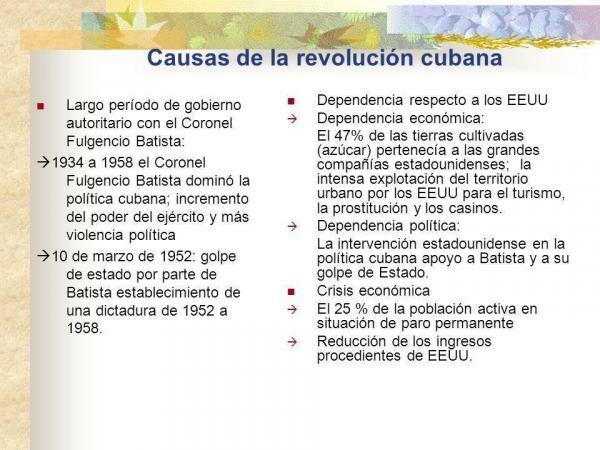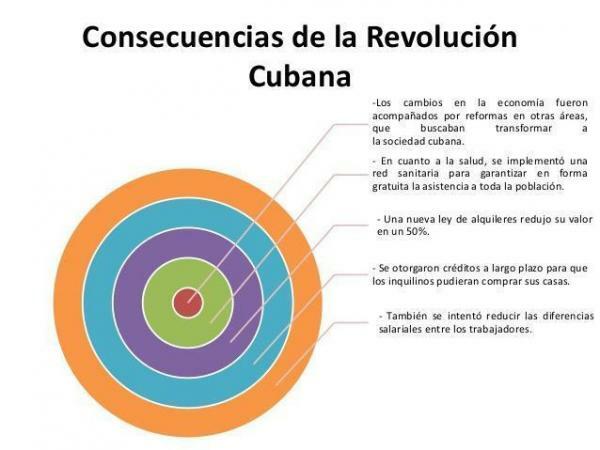Dictatorship of Cuba: causes and consequences

Image: Slideshare
One of the most important events in the 20th century for America was the Cuban revolution, being the first and the most successful of the leftist revolutions that took place in different states of the American continent. The Cuban revolution brought about the coming to power of Fidel Castro, which greatly influenced the Cold War and therefore the world of the time. Due to the importance of this revolution, today in this lesson from a PROFESSOR we are going to talk about the causes and consequences of the Cuban dictatorship.
In order to understand what were the causes and consequences of the Cuban dictatorship, we will begin by talking about the reason why Fidel Castro took command of the country.
Three were the main causes that led to the beginning of the Cuban revolution in 1953. These causes were what caused the fall of Fulgencio Batista, and the coming to power of the revolutionaries.
Economic crisis in Cuba
The country's economic crisis was one of the causes that started the movement of the Cuban people. Much of the lower classes of the country had serious economic problems, mainly due to the
lack of work and exploitation of local resources by the Americans.The main affected were the peasants, who demanded an improvement in their wages and better conditions labor, at a time when the country's most valuable product, sugar, was controlled by companies foreign. But the worst in the economic section of the country was the unemployment rate, being one and a half million Cubans who were without work.
All this caused a series of socioeconomic problems that were one of the main causes of the beginning of the Cuban revolution.
Dictatorship of Fulgencio Batista
Another important cause was the authoritarian and dictatorial regime of Fulgencio Batista, who had come to power in 1952. The dictatorship of Fulgencio Batista created a strong opposition that did not welcome the military coup by which the Cuban leader had come to power. Batista had American support and with the support of some of Cuba's upper classes, but the corruption and mismanagement of his government made support for the Cuban revolution greater.
Dependence with the USA
The last cause was dependence on the United States. Due to the economic weakness of the Batista regime, it did not take long for it to ally itself with the United States, which supported the Cuban country so that it will not ally with the USSR, enemy of the USA on the Cold War. That is why the United States controlled a large part of Cuba's industry and raw materials. This caused that there was a great economic dependency, and for that reason it grew in malaise between the Cuban population.

Image: SlidePlayer
To continue with this lesson on causes and consequences of the Cuban dictatorship, we must talk about the consequences of the Cuban revolution. The importance of this revolution can be seen in the great amount of consequence that it brought both for the Cuban country and for the rest of the world.
- One of the consequences is nationalization of the Cuban economy, passing to the control of the State of Cuba, public services, the sugar industry, banks, agricultural lands and a large number of companies. This was intended to end dependence on the United States and move to much more local control.
- The Cuban government granted long-term loans so that citizens could buy their houses, to which a new rental law was added that it lowered its value up to 50%.
- The free of charge for all services, such as electricity and water, and food and clothing were provided for the population.
- Another economic measure was the policies for reduce pay differences between the different workers.
- But the measures of the Cuban dictatorship were not only economic, since there were also social measures. One of them was the country's literacy process, creating for them new schools and universities, because it was considered that illiteracy was one of the great problems of the country.
- The other great social reform in Cuba was that of its health system, implementing a health network to guarantee of free form that all citizens had free medical assistance. Hospitals and clinics were also created to cover the entire population.
- Another consequence was the Cuban support for the Soviet socialist bloc, due to an anti-imperialist speech, against the United States. This eventually led to an economic embargo on Cuba by the United States, and a bad relationship between the two countries that would last until 2015, the year in which both countries resumed relations diplomatic.




